
Introduction
The Municipality of O Rosal is located in the southwest of the province of Pontevedra, in the Baixo Miño region, about 70 kilometres from the provincial capital. In 2022 it had 6,450 inhabitants. It has an area of 44 square kilometres and is classified as a sparsely populated area, according to the Galician Institute of Statistics.
It is part of the EU Rural Development Group (RDG14).
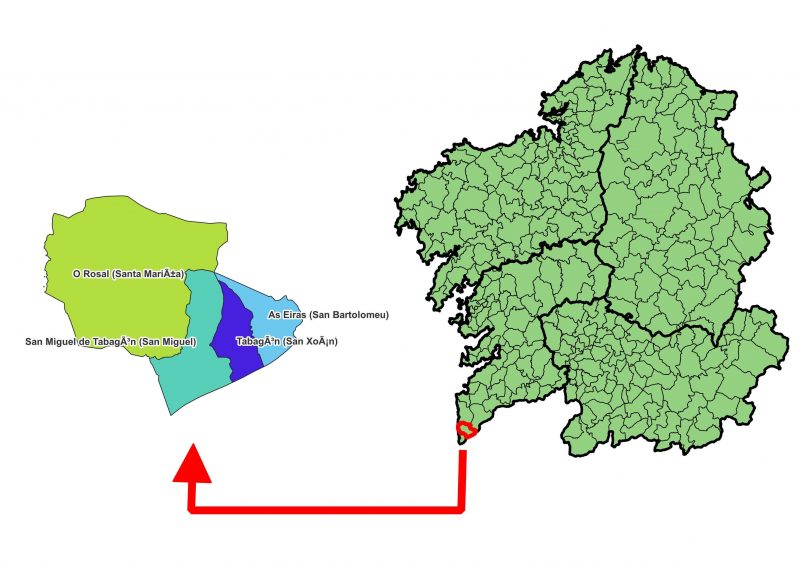
Population and demographic structure
The population of Rosal was growing dynamically, with an increase of 11.65% between 1991 and 2022. In terms of the number of inhabitants, there has been a significant increase between 2000 and 2011, from 5,800 to 6,600 inhabitants. After these years, there was a decline that continued until 2019, with a recovery to 6 450 inhabitants in 2022.
The Total Dependency Ratio (TDR) was 57% in 1998 and fell to 52% in 2009. From 2012 onwards, the trend reverses, reaching 57.5% in 2022.
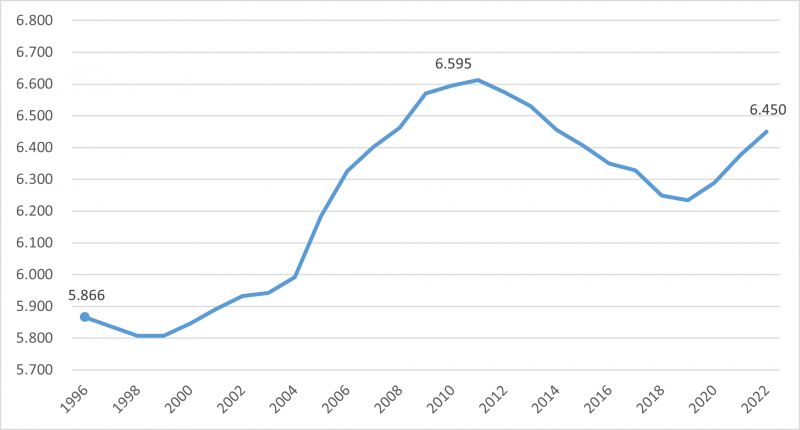
Population dynamics in O Rosal.
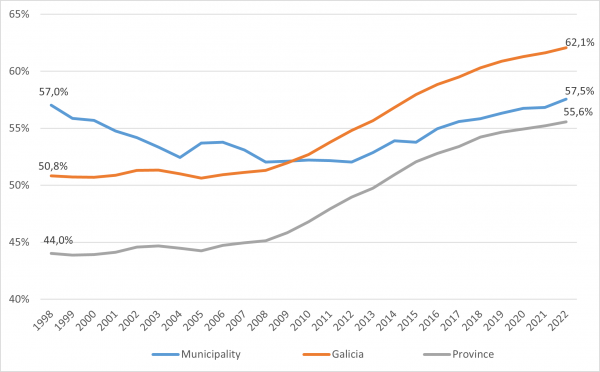
Evolution of the total dependency ratio of O Rosal, Pontevedra and Galicia.
Economy
The evolution of Gross Disposable Product (GDP) of O Rosal showed an evolutionary dynamic of its GDP very much in line with the trend at provincial and regional level. It was characterised by a significant increase since 2014, followed by a sharp decline of -5.5% between 2018 and 2020 due to the impact of the pandemic. The total GDP of the municipality was 73.12 million euros in 2018, representing 0.37% of the GDP of the province of Pontevedra and 0.12% of that of the Autonomous Community.
The Gross Disposable Income (GDI) showed a stable evolution in O Rosal from 2002 to 2020. It fluctuated in 2007 with an increase of 18%, reaching 14,000 euros per inhabitant. Subsequently, a decline was observed in 2014, followed by a fall in 2020. In this period 2014-2020, the growth was 16%. In 2020, the loss in housing was -2.6%.
Using the register of social security affiliations as an estimate of municipal employment, O Rosal stands at 68% in 2022. The employment rate has increased significantly, reaching 58% in 2022. The unemployment rate will fall from 24.6% in 2011 to 13% in 2022.
In 2022, O Rosal had an activity rate of 68%. The number of active persons remained constant between 2011 and 2022, while the number of employed persons increased by 14%. The number of unemployed decreased significantly by 46%.
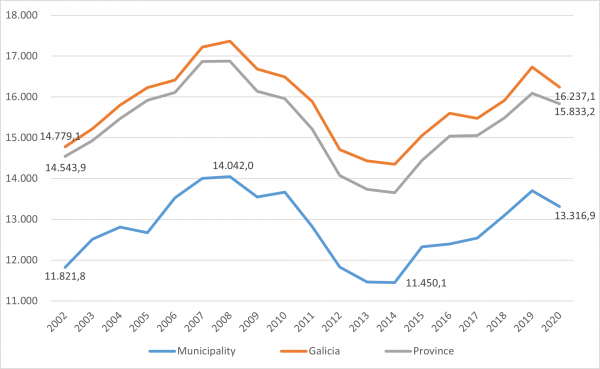
Evolution of Gross Disposable Income per inhabitant in O Rosal, Pontevedra and Galicia.
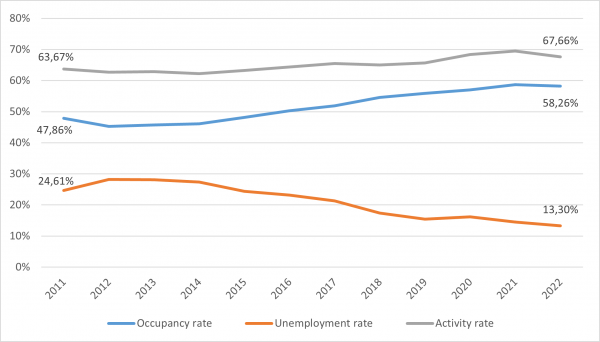
Evolution of employment, unemployment, and activity rates in the municipality of O Rosal.
Energy resources
O Rosal has a renewable energy supply, highlighted by its solar photovoltaic system with an installed capacity of 8.3 kW. Therefore, initiatives to promote and expand renewable energy generation facilities in the area will play a crucial role in boosting local energy development.
The estimated electricity consumption of O Rosal in 2023 was 13,963.57 MWh. The residential consumption was 8,652.35 MWh. Utilities, including municipal services, consumed 3,928.73 MWh. Industry consumed 1,382.48 MWh.
Energy Policy Councils
Date of the first meeting:
Meeting not held.
O Rosal background
The project technicians met on several occasions with the municipality’s government team and with technicians from the Environment and Citizen Participation departments. During these meetings, ideas and documents were exchanged, demonstrating the perfect match between the council’s energy transition strategy and the project’s strategic objectives.
For its part, the City Council of O Rosal participated in two activities organised by EC4RURAL: two workshops during which the Mayoress of Rosal presented the energy situation of the municipality and the initiatives being developed in terms of energy transition.
Finally, it is worth mentioning that the first meeting for the constitution of the Core Group has not yet taken place in the municipality of O Rosal due to the fact that the municipality is at an advanced level in terms of the work done in energy transition and public awareness. Proof of this progress is the fact that it is the only rural municipality in Galicia to have a Community Transformation Office (CTO) in place, a pioneering initiative that strengthens its commitment to sustainability and community participation in energy management.
The Community Transformation Office of O Rosal will have several key functions. Its main objective will be to promote the transition to a more sustainable and equitable energy model by facilitating access to renewable energy and promoting energy efficiency in the community. In addition, the office will act as an information and advice centre for citizens, helping them to understand and implement energy measures. It will also coordinate community energy projects, such as community solar installations, and work to educate and raise public awareness of the importance of the energy transition.
Moving forward the local energy transition
The public opening of this office is planned for the end of July. On the occasion of this initiative, the first meeting of the EC4RURAL project will be held, inviting all the actors involved in the process of developing an energy community. This meeting will be fundamental in laying the foundations of the Core Group and defining the first actions and strategies to be followed. The meeting will be attended by representatives of the town council, local organisations, businesses and citizens in general who are interested in actively participating in the construction of a community and a sustainable energy model.
In addition, the City Council and the Community Transformation Office have planned internal training sessions for the technical staff of the City Council and for the professionals who will manage this office in the field of community energy. These trainings, in which EC4RURAL will participate as a trainer, will cover technical and practical aspects of managing and promoting renewable energy, as well as methods for involving the community in these projects. This training process will ensure that the team is prepared to face the challenges and take advantage of the opportunities presented by the energy transition.
Conclusions
In conclusion, the municipality of O Rosal is positioning itself as an example in energy transition and citizen awareness, standing out as the first rural council in Galicia to develop a Community Transformation Office. This effort not only underlines its commitment to sustainability, but also lays the foundations for the creation of a solid and participatory energy community. The whole learning process that is opening up here will be of great use in extending the results of the community energy transition that EC4RURAL is working on to other areas.


